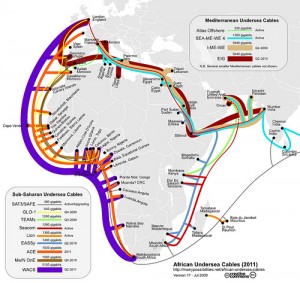The arrival of the GLO-1 submarine cable in Lagos this weekend has West African bloggers excited. GLO-1 connects Nigeria and 13 other West African countries to the global telecommunications system via Europe, bringing new bandwidth to the region.

GLO-1 is Africa's newest submarine cable.
Map via Many Possibilities.
In late July, damage to the SAT-3 cable — which until last weekend was Nigeria's only link to the global communications system — crippled bank services and Internet access throughout the country. Approximately 70 percent of the country's bandwidth was affected.
According to the Chief Operating Officer of Globacom Limited, which financed the GLO-1 project, the new system will be able to meet all of Nigeria's broadband needs for the next 15 to 20 years. Bloggers are looking forward to faster speeds and cheaper and more reliable access.
From Cameroon, Bill Zimmerman writes:
The cable is expected to drive down broadband costs and provide faster and more robust connectivity for voice, data and video services. The technology sector in West Africa stands to benefit from Glo-1 as companies will be able to communicate more easily with clients and partners overseas. It equally holds promise to open Internet access to individuals and small businesses who’ve been unable to afford connections of their own.
For Yomi Adegboye of Mobility Nigeria, the improvements GLO-1 promises can't come soon enough:
Before now, the entire country depended on only the SAT-3 cable under the monopoly of NITEL for cost-efficient high-speed access. Industry watchers have been in expectation of Glo-1 for months now, as its launch will undoubtedly impact on the cost and delivery of high-speed internet access in Nigeria.
Now that Glo-1 is here, when exactly do we begin to enjoy the services?
GLO-1 is unique in that is the world's first privately owned submarine cable. Theresa Carpenter Sondjo of Appfrica explains:
Most undersea cables, including the SAT-3 that currently connects West Africa to the rest of the world, are built by consortiums of private and public (national) companies. Glo-1 is unusual because it was financed entirely by Nigeria’s GlobalCom…. Nigeria currently depends on the NITEL monopoly for access to its own SAT-3 landing station and buys extra bandwidth from neighboring Benin.
Munashe Gumbonzvanda of TechMasai adds:
The interesting thing about the cable is that unlike other ventures like Seacom [Editor's Note: Seacom, a cable connecting the eastern African coastline to Europe and Asia, went live in July 2009], this venture was entirely financed by Glo alone. The consequences of the Glo-1 are major, but will probably take a while to take effect. This as with Seacom is a great moment for African technological innovation and development.






9 comments
does anyone know whether this will b coming to Sierra Leone and when? they need it there badly, internet service there is crap.
@Muchato, no. It leapfrogs six countries between Accra and Dakar, which includes Sierra Leone and is a great shame that I talk about on my latest article.
@Rebekah you should credit that bandwidth map you used as Steve has put a good deal of time in to maintaining all these very awesome graphics.
Also, the cable wasn’t actually cut in Nigeria. It was cut off neighboring Benin, which in turn really hurt Nigeria as they were routing massive loads of data through Benin due to that connection to SAT-3 costing less than the absurd prices to connect to their own SAT-3 if you can believe that, which most of us probably can.
@Miquel – I’ve credited the map and added a link that further explains the SAT-3 damage in July. Thanks!
This is great news. Hopefully there will be an infastructure in place to distribute this broadband inland.
One day all people will have unrestricted access to the internet and we can truely be a global community :)
I think this will gladen the heart of internet users in Nigeria. The problem of slow and sluggish server will come to end . Bright B. Upoh
Recents of Nigeria who use glo mobile for internet connectivity are already reporting significantly increased speeds. :-) It obvious that residents of Ghana would enjoy same when glo finally launches their cellular network in Ghana.
We’ve been happy in Nigeria with the current internet speed of glo but the phone calls with glo line reccently has not been encouraging at all. I thought the introduction of the submarine cable will bring about a complete imrovement in all glo services be it internet services or phone calls services. If there’s any thing i’m proud about glo of, is that is an indigenous company own by a Nigerian that is doing absolutely well. But i’m not happy that glo did not take into consideration the average Nigerian, the low income earners or the common man who uses regujar internet enable phones. In glo internet data plan the amount is high yet the say is for 3G phones only. While foreign companys like Zain, Etiselat, etc, have prizes as low as N1000 for 1oomg a month for all phones. Our own brother could not do that for his fellow Nigerians, is disheartening. I want our big brother Mike Adenuga and the glo management to think about it. Is it good? Bright B. Upoh.